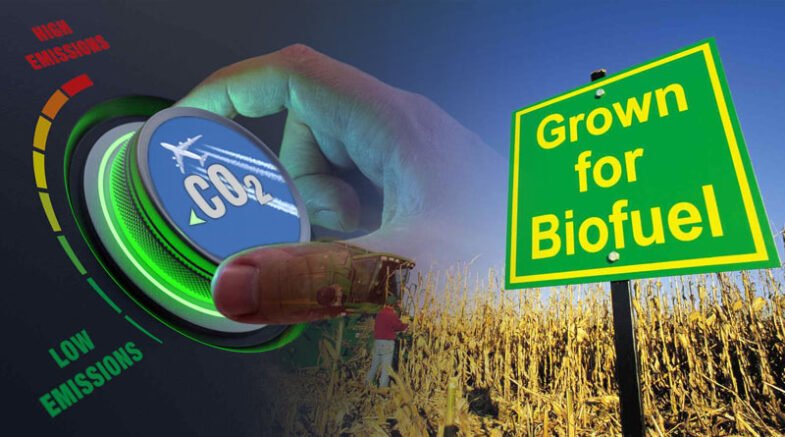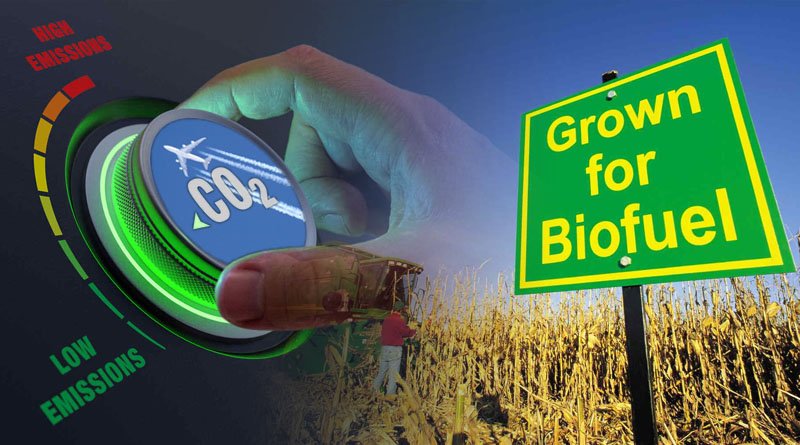The use of biofuels and synthetic fuels, according to a report this week by Aircraft Leasing Ireland, could cut emissions by up to 90% when compared to aviation kerosene.

The use of biofuels and synthetic fuels, according to a report this week by Aircraft Leasing Ireland, could cut emissions by up to 90% when compared to aviation kerosene.
Thanks to our growing renewable energy sector and the use of residues from agriculture and forestry, the authors of the report contend that Ireland is well positioned to develop and produce what they refer to as sustainable aviation fuel. To make these purported new energy sources a reality, it seeks government assistance, or subsidies.
Few issues are as complicated as decarbonizing the aviation sector, and one of the most straightforward solutions currently being advocated is turning vast tracts of farmland into fuel to satisfy the industry’s insatiable appetite for energy.
Extreme weather events brought on by climate change, as well as the ongoing conflict in Ukraine, are already severely stressing food production in Europe and elsewhere. Is it really a good idea to divert millions of hectares from food production in order to feed aircraft instead, pushing up food prices for millions of people?
According to Transport & Environment, a Brussels-based NGO, a portion of land in Europe larger than the island of Ireland is already devoted solely to the production of biofuels. The main purpose of this is to satisfy the EU’s E10 mandate, which states that 10% of a given fuel must be biofuel.
It is claimed that this regulation will help decarbonize motor transportation, but many contend that, in light of the rise of electric vehicles, it is simply a waste of resources and land that will prolong the dominance of internal combustion engines.
T&E’s analysis revealed that the 9.6 million hectares of agricultural land in Europe currently used to grow biofuels is 40 times larger than the mere 250,000 hectares that solar panels would need to supply the same amount of energy if they were instead powering electric vehicles.
Crop biofuels are most likely the stupidest thing ever promoted in the name of the environment, according to Maik Marahrens, a biofuels expert at T&E. An experiment gone wrong is biofuels. While there is a growing global food crisis, it is practically illegal to keep burning food as fuel.
307 million litres of what the Department of Transportation refers to as “renewable fuel” were sold in 2022, according to its data. Eamon Ryan, Ireland’s transport minister, recently announced that the country would switch from E5 to E10 gasoline, doubling the amount of biofuel in each litre of gasoline sold there.
This takes effect on April 1st, which is only fitting. As one of several transportation measures to achieve a 51% reduction in transportation emissions by 2030, Ryan referred to the switch to E10 as such. While increasing the amount of biofuel in a litre of gasoline may result in a 5% reduction in emissions, the Department of Transportation’s statement makes no mention of the additional effects of increased biofuel use.
While using croplands to fuel automobiles may result in a small reduction in carbon dioxide (CO2) emissions, these benefits are likely to be offset by the land’s negative effects on food security and biodiversity.
Of course, this is before the effects of oxymoronically referred-to “sustainable aviation fuels” are considered. Currently, aviation produces about a billion tonnes of CO2 annually. Last month, a report on the resource needs and environmental effects of purported net-zero aviation fuels was released by the Royal Society in the UK.
Its main finding is that there simply isn’t a viable substitute for jet fuel that could be used to match the enormous amount of flying that is currently done. Around half of the UK’s agricultural land area would be needed to produce enough biofuels, including “energy crops” like rapeseed, miscanthus, and poplar, to meet the country’s current aviation needs. Would people actually choose to fly over eating?
Future aircraft could be powered by green hydrogen, but this is a significantly more energy-intensive option. According to the study, even if the significant challenges associated with adapting aircraft to run on hydrogen could be surmounted, in 2020, it would consume twice to three and a half times the UK’s entire renewable energy output.
The Royal Society report hinted at the fact that there is a straightforward solution to these intricate technological puzzles when it stated that “reducing the amount of air travel” would simultaneously relieve all of these pressures.
Unsurprisingly, neither demand reduction nor effective CO2 pricing were mentioned in the Irish aviation industry report this week. Additionally, the critical issue of using valuable farmland as aircraft fuel was not given serious consideration.
Ironically, the T&E study found that if the land in the EU currently used for biofuel production were simply left to rewild, it would absorb more than twice the CO2 that biofuels claim to save while also acting as a vital lifeline for biodiversity and climate protection. This idea has potential to take off.
